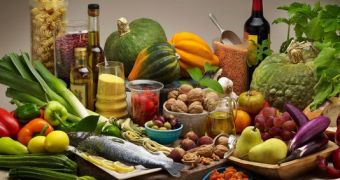According to a study published this past February 25 in The New England Journal of Medicine, people who have a Mediterranean diet are less likely to experience heart attacks and strokes, meaning that they can live to be significantly older than individuals who embrace a less healthy lifestyle.
The researchers who conducted this study into how a Mediterranean diet improves on one's overall health explain that, according to their findings, people who mostly feast on fruit, vegetables, fish and nuts are about 33% less likely to suffer a heart attack or a stroke.
In order to reach these conclusions concerning the benefits of having a Mediterranean diet, the researchers asked a total of 7,447 volunteers in Spain to set aside their usual foods for a period of almost five years, and eat according to new recommendations.
Thus, these volunteers were split into three groups: two were asked to have a Mediterranean diet supplemented with either olive oil or nuts, whereas the third was asked to only have a low-fat diet.
“A systematic review ranked the Mediterranean diet as the most likely dietary model to provide protection against coronary heart disease,” the researchers conclude in their study.
Furthermore, “The risk of stroke was reduced significantly in the two Mediterranean-diet groups. This is consistent with epidemiologic studies that showed an inverse association between the Mediterranean diet or olive-oil consumption and incident stroke.”
In case anyone was wondering, a traditional Mediterranean diet basically consists in one's eating quite a lot of olive oil, fruit, nuts, vegetables and cereals.
Although fish and poultry can be eaten in moderation, dairy products, read meat, processed meats and sweets are only consumed every once in a while.
Lastly, wine is allowed, yet it must only be drunk in moderation and accompanied by a meal.
“Salient components of the Mediterranean diet reportedly associated with better survival include moderate consumption of ethanol (mostly from wine), low consumption of meat and meat products, and high consumption of vegetables, fruits, nuts, legumes, fish, and olive oil,” the study emphasizes.

 14 DAY TRIAL //
14 DAY TRIAL //